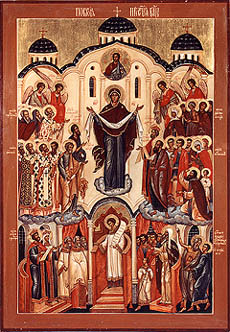Even an hour before service time, I wasn’t sure whether I wanted drive to church on Tuesday evening. The Paraklesis service, in its Small and Great forms, is a supplicatory canon to the blessed Virgin Mary that is chanted almost daily during the first two weeks of August. The services are beautiful, but they’re seriously inconvenient.

Around here, the Paraklesis takes place at 6:00 or 6:30, smack in the middle of dinnertime. And, of course, our secular world does not make special allowances for times of worship, feasting, and fasting. In order to attend, I need to prepare meal ingredients toward the end of my workday and eat early or eat late. Or start the slow cooker in the morning if I’ve remembered to prepare ahead. Our dog Cassie must be walked later than usual—after the service, the commute, and dinner, when I’m worn out.
And yet, during the Dormition Fast I want to turn my thoughts toward the Virgin Mary and her example of holiness and purity. I want to ask her supplications and join with others in prayer and song, in spite of the scheduling difficulties. So I do my best to attend at least a few times per week, even when I don’t really feel like going. And I discover something unexpected: after the final prayer, I don’t think, “Whew! Checked that box off my list.” Instead, I want to attend again.
Especially now, with the stress of the coronavirus epidemic, the contrast between the peace of the Mother of God and the chronic anxiety of the outside world is stark. But our historical moment is not an unusual circumstance, with an irrelevant, sentimental little religious service tucked into the calendar. The Paraklesis (or Moleben, if your church has Slavonic roots) is a service that Orthodox believers have prayed during seasons of death, sorrow, and distress for more than a thousand years.
A Prayer Service during Times of Societal Distress
Believers have gathered for centuries to request the help of the Holy Trinity and the prayers of the Theotokos in the midst of war, attack, and oppression.
Save your people and your town.
You are the peace of those in conflict,
The calm of those in turmoil,
The only protection of the faithful. (Intercessory Troparia)

We may not fear foreign invasion at the moment, but societal turmoil, injustice, and conflict are daily staples in the news.
Deliver all of us
From the dangers, Theotokos, most pure,
For you bore the timeless deliverer,
And you bore the peace,
the peace which has surpassed all thought. (Ode 5)
A Prayer for Times of Plague
As Fr. Michael Gillis noted recently in his Ancient Faith blog Praying in the Rain, the Small Paraklesis was written in the 800s “both to give thanks for victories against attacking enemies and to beg help and protection from further military attacks and from the plague. Yes, the plague.”
Twelve hundred years after the Small Paraklesis was composed, its anointed words are strangely current. Our brothers and sisters in Christ chanted this service during the Black Death in the middle of the fourteenth century, when a mysterious plague spread across Europe, killing millions of people.
I lie now on a bed of infirmities,
And there is no healing at all for my body
Except for you,
Who has brought forth our Savior,
God, the healer of all our infirmities;
Of your goodness, I pray to you,
From corruption of sicknesses raise me. (Ode 6)
Like us, those who survived the plague or avoided infection struggled with fear, grief, isolation, and despair.
I entreat you, O Virgin,
Disperse the storm of my grief,
and the soul’s most inward confusion,
Scatter it far from me. (Ode 3)
Still the darkest of passions,
Calm the sea of errors
In your great peacefulness;
It was you who bore the guiding Lord,
And you who are the blessed bride of God. (Ode 4)

Then, people feared the ravages of the Black Death. Now, we fear the ravages of COVID-19. Yet our human need and our cry for help remain the same.
In our era of plague, the deaths and lingering illness from the coronavirus are accompanied by a psychological crisis that afflicts all ages and economic classes with anxiety, panic attacks, depression, and suicide. And so we pray:
O Mother of the Word, and ever-Virgin,
From all distresses and dangers deliver me. (Ode 1)
Turn to me,
In your good favor, all praise-worthy Theotokos;
Look upon my grave illnesses
Which painfully sting my flesh,
and heal the cause of my soul’s pain and suffering. (Troparia)
These verses address the burdens that we all carry now, in every area of our lives: physical, emotional, spiritual, and societal.
With most serious ailments,
And with the passions so dark,
I am being tested, O Virgin,
Come and bring help to me;
For I have known of you,
That you are without fail
the endless treasure of cures,
Only all-blameless One. (Ode 3)
Unexplainable Joy in the Midst of Sorrow
From the first time I attended a Paraklesis service, one particular ode stood out to me—so much so that I took a picture of the written text on my phone to contemplate later:
![]()
Pure one, fill my heart
with a merriment, a happiness;
Bestow on me your spotless joy,
For you have given birth
to Him Who is the cause of joy. (Ode 5)
What? These words arrive in the middle of a service of “supplication,” defined in Wikipedia as “a form of prayer, wherein one party humbly or earnestly asks another party to provide something.” This request for joy in times of suffering surprised me. Even now, after singing this verse many times over the years, the words feel incongruous.
“A merriment, a happiness…your spotless joy”: this is more than emotion and certainly unrelated to outward circumstances. This kind of joy is a gift. We sing this request, confident that it will be granted, and realize that the message harmonizes with the tone of St. Paul’s Letter to the Philippians, where the apostle, probably under house arrest in Rome when he wrote it, mentions the word joy five times.
From Anxiety to Peace
And so I chop vegetables and pile ingredients on my cutting board. I drive to church, thinking about incomplete projects at work, the dinner that still needs to be cooked, the expectant doggie waiting for a trot, and the prime weeding time that I am missing as the day finally cools enough for yard work. Underneath all the distractions, a low-grade anxiety thrums through my heart, sapping my energy, tightening my neck muscles, and filling my mind with worry.
Nothing is normal. My haircut requires a mask. Shopping requires a mask. Hand sanitizer is a part of my daily routine. I miss people. I miss large groups of people, packed together like sardines in a pew or in a queue.
I want to curl up on the sofa and turn off my mind.
I do not want to stand for 45 minutes.
And then, I enter the church, and the Psalms, the prayers, and the petitions fill my soul.

Assaults of the passions have shaken me,
My soul to its limits
Has been filled with much despair;
Bring peace, O Maiden, in the calmness,
Of your own Son and your God, all-blameless One. (Ode 1)
The word peace washes over me again and again. The love of the Holy Trinity, the quiet presence of the saints surrounding us, and the beautiful holiness of the Panaghia fill the nave and the spirits of the tired, distracted worshipers.
There is no space for anxiety here.
And I remember that the weeds will still be there tomorrow, and that’s okay. I can eat late. Filled with the worship of the Holy Trinity and inspired by the blessed Mother of God, I can enjoy that late walk with the doggo, appreciating the cooler evening air and the beauty of late summer flowers and overgrown yards.
I am glad I came.
Thank you. This fills me with peace.
I’m glad, Helen. Thanks!
Lynette, Thank you for the beautiful words. It was a blessing to me to read them. . I’m still researching Orthodoxy .. but somehow, like this blog, it always “calms” in the end… Thank you 🙏
May God bless you as you continue your investigation into the ancient Church! My husband and I had a difficult two years journeying into Orthodoxy, but the beauty and unchanging truth kept drawing me. 🙂
Thank you, thank you, for offering these words.
You’re welcome! Blessed Feast of the Dormition to you!